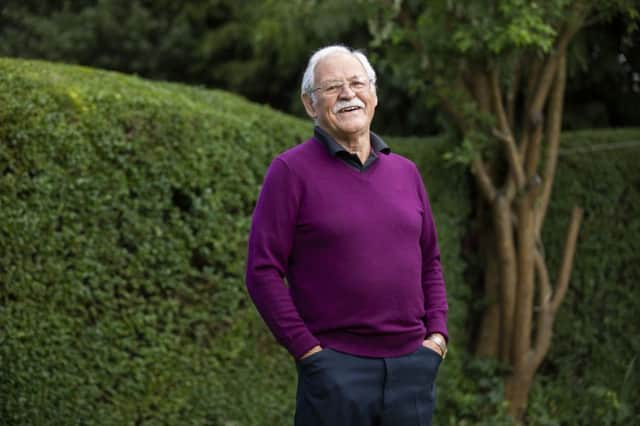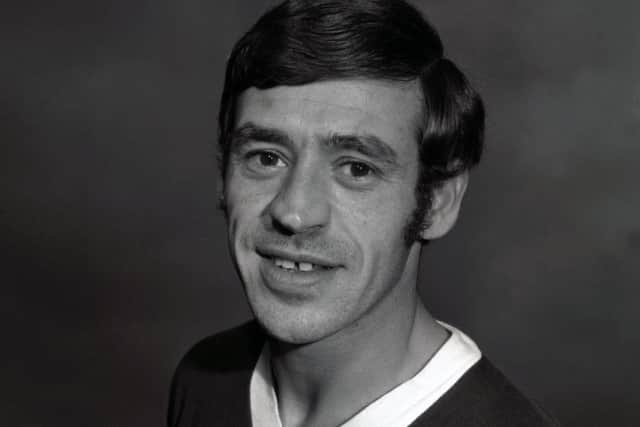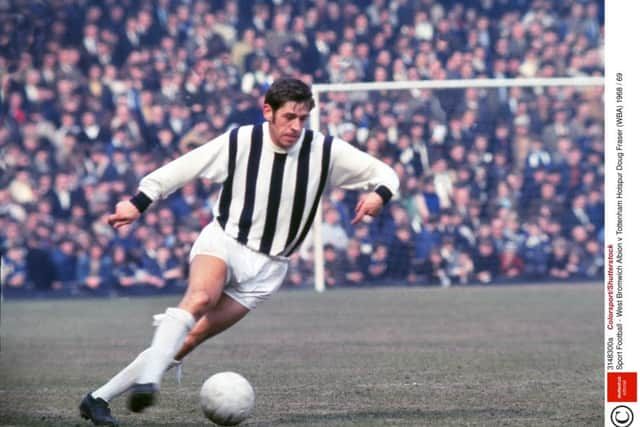Saturday Interview: Doug Fraser on crushing Cyprus and locking up Reggie Kray


Doug Fraser was the ex-Don, West Brom cup-winning hero and right-back in Scotland’s first-ever international with Cyprus who didn’t fancy opening a sports shop or running a pub when he hung up his boots and instead became a prison warder.
While Ronnie in Broadmoor could request that pork pies from Harrods and Puccini LPs be brought in for him, Reggie had porridge a bit tougher, being shunted from jail to jail in rapid succession. Friends and family believed the judicial system was trying to break his spirit and one of the prisons was Nottingham, where Fraser worked.
Advertisement
Hide AdAdvertisement
Hide Ad“He was a funny wee guy and a bit dour,” says Fraser of by far the most notorious of the jailbirds in his care from 22 years as a guard. “I probably thought he was going to be livelier, given his reputation.” The Krays’ reign came to an end in 1969 when both were handed life sentences for gangland slayings, Reggie for killing fellow hoodlum Jack “The Hat” McVitie.


“I wasn’t scared of him. Dinnae forget: I played football against Bremner and Mackay – two right tough cookies,” he adds, meaning of course fellow Scots Billy and Dave. “Reggie had his gophers who he got to do his dirty work. A lot of the time he was just writing letters.” Among his penpals was at least one person, at the time a schoolboy, who changed his name to Kray, with Reggie claiming him as an unofficial adopted son, and Max Bygraves, who was worried he might have incurred the mobster’s displeasure in his showbiz memoirs. “Reggie wasn’t any trouble while he was with us. He was quiet and courteous and I suppose when I think back he was a bit of a disappointment.” There may be some – and they’d mostly be Baggies fans – who won’t be surprised that Fraser ended up in such a challenging job. I’ve got one in my office who tells me: “Doug was hard. He was an enforcer before the term was used in football – when every club had a guy who’d sort out any trouble. I once saw him send George Best over a terracing wall with a tackle.”
This jovial fellow of 77 laughs when I mention the altercation, along with some WBA fansite chat under the heading “Who was our hardest?” recalling the Midlands derby when our man chased Wolves’ Dave Wagstaffe into the crowd. “Those were the times, weren’t they?” says Fraser who was eight years at The Hawthorns, helping them lift the FA Cup in 1968. “It was hit or be hit. I don’t remember that tackle on George but I’ll never forget the first time I came up against him. He nutmegged me and was down the wing in a flash. He called back: ‘Next time, Doug, shut your legs.’ Fantastic player – the best – lovely Irish accent and a lovely fella. And of course Man U also had Denis Law, who was like a bullet out of a gun.”
Those were the times, too, when the national team could line up against a Cypriot XI and The Scotsman would ask: “What’s the world coming to?” More specifically: “What’s the World Cup coming to?” In his match report of the qualifier in Nicosia, our esteemed football correspondent John Rafferty reported that if the tournament was going to “justify its name… surely some way could be devised to avoid debasing it with such a one-sided encounter played in such primitive conditions”.
Scotland won 5-0 and Rafferty scorned the home team for only earning a single corner. He scorned the stadium and the pitch, which he said, was “like mortar”. But none of this really mattered to Fraser who was making his first – and last – competitive appearance for his country.


“It was a pokey wee place and the rain wouldn’t stop but Gilly [Alan Gilzean] scored almost immediately and that sent us on our way. What a player he was – a classical centre-forward. When I was at Aberdeen and he was at Dundee he couldn’t stop scoring against us. He was a holy terror.”
There’s a funny story about that international. The Lisbon Lions’ right-back Jim Craig, a dentist the rest of the week, had cleared his diary in anticipation of being called up to the squad and, when he wasn’t, reported to the surgery as usual. Then Tommy Gemmell got injured; could his fellow Celt be a late replacement? He couldn’t, being fully booked, so while Craig was filling teeth, Fraser filled in for him with the Dark Blues.
“It was wonderful for me, a boy from Eaglesham, to get to play for Scotland. That’s the pinnacle for any footballer. How can you beat it? A week after West Brom won the cup [manager] Bobby Brown picked myself and [club-mate] Bobby Hope for a friendly against Holland. But these were my only two appearances. It would have been great if I could have turned out at Hampden just the once, so my lovely mum and dad could have watched, but that wasn’t to be. It would be nice, too, to have been given the actual cap. I contacted the SFA who said they would send it down but I’m afraid I’m still waiting.”
Advertisement
Hide AdAdvertisement
Hide AdIn his East Renfrewshire youth, Fraser played for local teams while working at the Rolls-Royce factory at East Kilbride. “Listen to this: I was the top apprentice two years running.” What did he win? “Oh, just a slap on the back: ‘Get on wi’ it.’” He signed for Aberdeen in 1960 when they were managed by Tommy Pearson, who had the distinction as a player of turning out for both Scotland and England, the latter as a guest from the crowd replacing an injured man in a wartime international.
Fraser, who has retired to Nottingham with his partner Maria, loved his time at Pittodrie. “We trained on the beach, we had characters like Tubby Ogston and half a dozen of us shared digs in Great Western Road where the landlady, Mrs Robertson, cooked up braw mince and tatties. As a club we were a bit up and down – we could beat Rangers 6-0 and yet get thrashed by Airdrie – but we had one big superstar in Charlie Cooke. He and I got on great, and I was glad I wasn’t up against him with his fancy trick of running his foot over the ball then whipping it away, although that happened later when we both moved to England.”
At that time Fraser was playing a variety of positions. “I was all over the park – like dogshit,” he laughs. West Brom were watching him and in 1963 made a £23,000 offer. “I was nervous about moving. I wasn’t just leaving Aberdeen, I was leaving my country – me, a little Scottie boy. But eventually I decided to go and I’m not bragging or anything like that but I think I was a success down there.”
A period of adjustment, though, was required. “I’d only arrived the night before and was pitched straight into a derby against Birmingham City. We won 3-2 but do you mind if I swear? My f****n’ tongue was round my ankles from all the racing around. English football was much faster. I had to get used to that. I had to get used to the Midlands, too. This is a true story: I was walking down the street one day with a towel and my swimming trunks under my arm when I asked this bloke: ‘Can you tell me where the seaside is?’ He said: ‘Go 50 miles that way, 50 miles the other way, carry on for another hundred miles and you’ll soon come to it.’ Well, West Brom: it sounds like it should have a beach, doesn’t it?”
With Fraser on guard duty on the flank, intent on stopping left-wingers like Eddie Gray, Peter Thompson and Ralph Coates, the Baggies in the second half of the 1960s became a cup team of some renown. In ’66, a few months before World Cup glory, West Ham’s Bobby Moore, Geoff Hurst and Martin Peters would be thumped by the Albion in the League Cup final, a triumph Fraser insists they celebrated with “milk and grapes”.
West Brom would reach the final the following season, losing to Queen’s Park Rangers in a thriller, and again in 1970 when Fraser skippered a side featuring the teenaged Asa Hartford and Grangemouth-born Ray Wilson – the middle initial T distinguished him from the England international – who fell to Manchester City. But in ’68 there was a match which Fraser hails as “fantastico”. In truth it wasn’t much of a spectacle; no matter, it brought WBA the FA Cup.
There’s crackly footage on YouTube of David Coleman interviewing the victorious Baggies after the extra-time win over Everton with Fraser matter-of-factly describing the running repairs required when his knee was sliced open. “Early on I got caught by Johnny Morrisey’s studs. Our trainer said: ‘You’ll have to come off, Doug.’ ‘No way,’ I said ‘Stitch me up at half-time.”
His description of the winning strike may have been heard once or a thousand times before: “I got the ball, did a few tricks, sent the crowd the wrong way and pushed it through to Jeff Astle. He blootered it, there was a block and he blootered it again. Goal. The cup was ours. We drank ginger beer and paraded the trophy along West Bromwich High Street. There were folk hanging from gutterings so they could see us.” Fraser has fond memories of the centre-forward who suffered from dementia and died in 2002. “Jeff was a lovely man and so funny. On the bus going to away games he could tell the same joke 20 times over and we’d all still be splitting our sides. His death was so sad and he was so unlucky because we all had to head that heavy ball. What do footballers do about this? Start wearing crash helmets?”
Advertisement
Hide AdAdvertisement
Hide AdFraser also won the BBC’s Quiz Ball with West Brom that year, their guest fan being motocross rider Jeff Smith (Memo to the Beeb: bring back field-churning bike races on Saturday afternoons!). The Albion competed in the European Cup-Winners’ Cup the following season but were knocked out by Dunfermline Athletic, Fraser recalling a rumbustious East End Park cheering home their favourites. After 325 appearances he moved on to Nottingham Forest then Walsall, later managing the Saddlers to a famous FA Cup win over Tommy Docherty’s Manchester United. Then, having finished with football he bumped into an old team-mate, fellow Scot Bob McKinlay, who had in idea. “He said: ‘Ever thought of the prison service, Doug? I said: ‘It’s a wonder I’m not in there already.’ I was out of work so I thought I’d give it a try.”
College taught him some of the basics but if there’s ever an occupation where acted-out scenarios can’t replicate the real experience then warder is it. “The prisoners knew I was the new boy and they gave me a bit of an initiation test. The guards were banging them up at night – locking them in their cells. This big brute, 6ft 6ins, wouldn’t move. ‘Get behind your door,’ I said. ‘Make me,’ he said. ‘Bloody get behind your door.’ ‘Bloody make me.’ All the other prisoners were hanging over the balconies and cheering, just like happens in prison movies before a big break-out! Then everyone else got put in their cells and it was just me and him. ‘Get behind your door,’ I said. My little heart was going 19 to the dozen but he didn’t have his audience any more. ‘Ach,’ he said, ‘you screws are all the same. All you want to do is bang us up’.
“I fair enjoyed that job. You meet all sorts inside. The important thing is you have to be strong. ‘There’s a line,’ I told the prisoners, ‘and if you don’t cross it then we’ll be fine.’ And most of the time we were. You had to show who was boss and the prisoners seemed to appreciate having the boundaries in place. I suppose they were a bit like kids in that respect.
“Now and again the jail could be a spooky place. You’d maybe find yourself looking over your shoulder a bit more than usual. For instance, down by the old hangman’s room. If you were there on the nightshift you might have thought you’d sensed a ghost.” This unnerved him, but he’s Doug Fraser, so only for a brief moment.